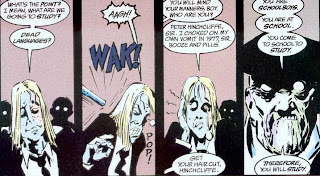
As a fan of classics like
V for Vendetta, I’ve been very impressed by the unorthodox and mysterious adventures of the Question in his comic series from the late 1980s. Our hero Vic Sage, who wonders if his greatest power is his curiosity, dresses up in a blank flesh-coloured mask and deals out kung-fu on those who try to stop him investigating crimes as "the Question". It’s all very Zen. The (rather dated) artwork, which is clearly going for “gritty”, portrays his traumatic personal journey well, and creates an immersive setting called “Hub City” – which just reeks of corruption for Sage to morosely contemplate or "kick to the curb".
Sometimes the short, connected stories seem to be trying to tick boxes for all the “then” social issues in America (poverty, drugs, identity, pollution, the rebellious youth, family break-up, the aftermath of Vietnam) and tap into the 80s trend for violent martial arts and riddles of eastern philosophy. But the fact that the writer Dennis O’Neil is embracing the unknown makes this book stand out in our age when we tend to think everything can be explained rationally through science.
Again and again O’Neil hints that there is a life beyond this one, implies that perfection is achieved when the mind and body are rightly controlled or focused, or deals with questions of the spirit and the possibility of redemption. Often he won’t give us clear answers – but the central philosophy seems to be a mix of self-knowledge and improvement and moral responsibility to society, including environmental concerns. Hence the ongoing development of former newscaster Myra’s quest to change society as she watches her husband, the corrupt, alcoholic mayor of Hub City, permit all kinds of wrongdoing, from drug-running, to extortion and murder.
For the Question, however, justice is good but mercy is preferable. He sees a fine balance in himself between serving society and becoming reckless in his pursuit of justice. In one issue (No 8: “Mikado”) he confronts a serial killer who is at times called a “saint”, but who, behind a mask, is murdering those he deems evil. He is trying to redress the balance in Hub City, where evil men consistently get away with their crimes at the expense of their families or the poor.
The Question quickly gets to the point where he knows the identity of the killer, but his curiosity wins out: “I know who he is. Now I’ve got to learn why he is”. Meeting the killer, he points out a flaw in Mikado’s sadistic system, showing that although he, Vic Sage, is far from “innocent” and used to beat a girlfriend and relish his physical power, he has since managed to use his life to save people. Point blank, he asks: “Do I deserve to die?” The story ends ambiguously. How can a person judge the answer to this? How do we balance it and is it up to us? How can the evil be dealt with rightly, with punishment, in a way that allows society to continue on and improve? And for those who commit evil, is change possible? These are not straight-forward questions to answer.
This is going to sound very direct, but these are exactly the problems explored in the New Testament of the Bible. The writers are at great pains to show the depth of the problem of corruption and evil running rampant. There is a problem with humanity, and it stems from the fact that we are not in tune with our creator, God.
Delving deeper into redeeming the corrupt
In the book of Romans in the New Testament, God delivers the verdict on all mankind. For our behaviour towards each other and for the secret sins of our hearts, and for our rejection of Him and His ways of living – we deserve death. We are all “under sin” (see Romans 3:9 onward). Romans 3:19 teaches that the whole world is accused of sin before God and no-one has a defence.
This is also how Jesus, who loves us, talks about humanity as recorded by Mark (in Mark 7:21-23): "For from within, out of men's hearts, come evil thoughts, sexual immorality, theft, murder, adultery, greed, malice, deceit, lewdness, envy, slander, arrogance and folly. All these evils come from inside and make a man 'unclean.' "
So what can be done? What is the answer to this huge problem? If a thoroughly good God is against us because we are “under sin”, how can we be redeemed in his sight today, and saved from his final judgement when it comes?
It is possible by Jesus’ sacrifice for us - when he gave himself to death on the cross 2000 years ago. This is what his purpose was: that he could truly be our “life” by taking away the curse we face of being “under sin” and facing that curse himself and owning it. He has faced and borne God’s judgement in our place – so we don’t have to! Those who accept this gift and receive Jesus as Lord and Saviour can be considered pure and righteous in God’s sight – we are redeemed.
A great change has come
Restored to God, as we start to follow him and worship him, we can be restored in other relationships as well, areas where we have been corrupt or selfish. This doesn’t mean a prisoner who becomes a Christian will no longer have to face a hard sentence. We still live for now with the consequences of our actions on other people. But in God’s eyes there IS mercy. There is forgiveness and purification.
And it's not just reporters in comic-books with mixed motives who can use their lives now to impact others positively. For Christians, real change is made possible as we live knowing of Jesus’ sacrifice and trusting in Him now, experiencing the new life that he shares with us. This new life will transform us. He will make us different, growing in love and right-ness. As we live with Him, corruption must be tackled, not ignored. And as individuals change, growing more like Jesus, and work together, communities can be changed.
Learning this answer to the question of redemption is the beginning, and will probably lead to a whole new set of questions, so please comment below....
And do pick up The Question volumes 1 and 2 - the first tackles nihilism, control and hypocrisy, the second includes another thought-provoking story called "Poisoned Ground", which is a brilliantly constructed drama, with perhaps something to tell us about commercialism.


























